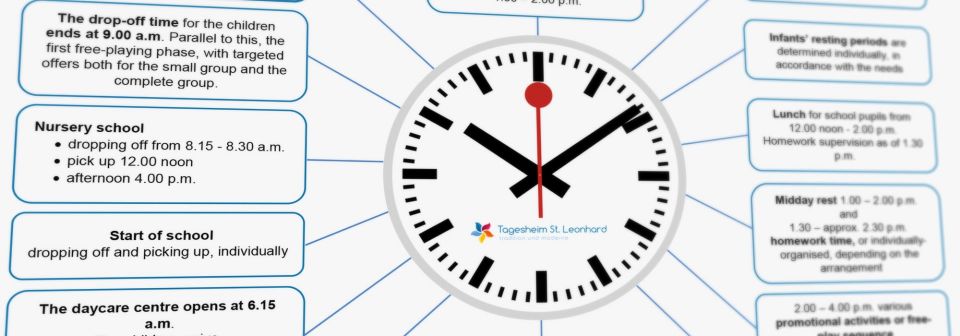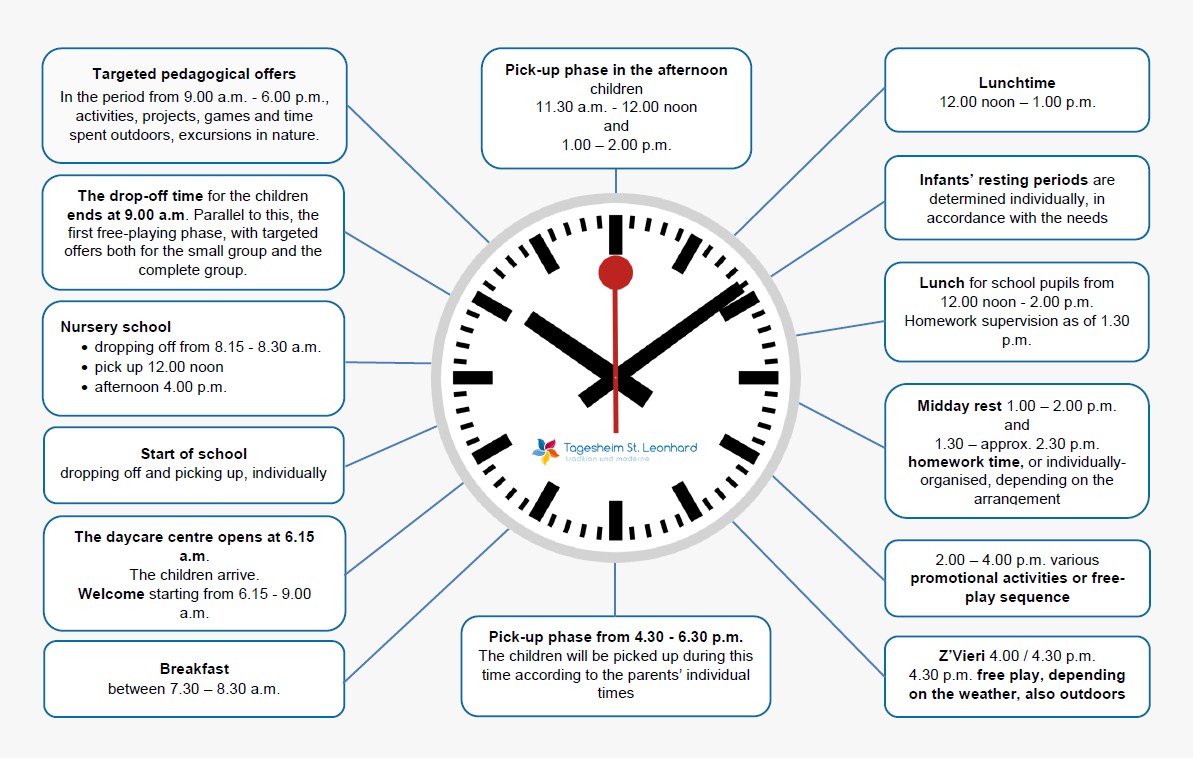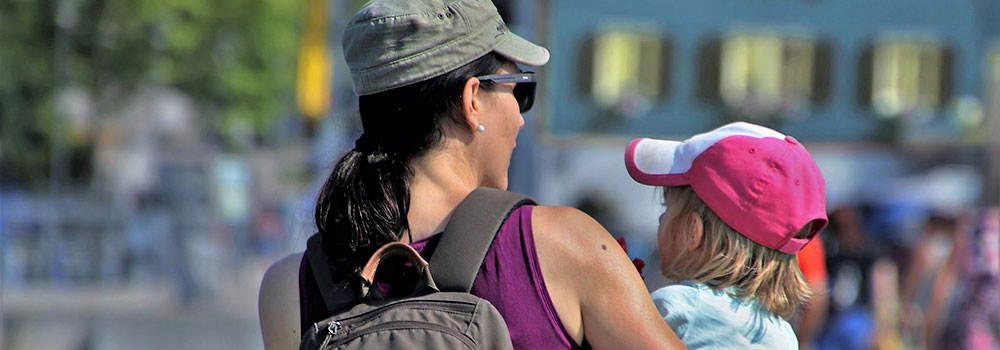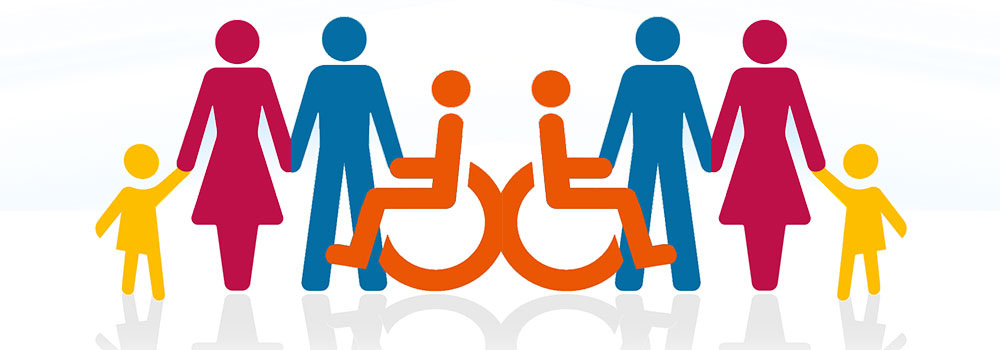The educational concept of the St. Leonhard daycare centre

Preamble
Humanistic principles shape our care work:
- The pursuit of autonomy: Every human being strives for self-determination and freedom.
- The pursuit of self-actualisation: Every human being has the need to realise and exploit their own potential.
- Human beings are whole entities: Every organism is a self-contained unit that is indivisible. If this unity is destroyed, physical and mental problems arise.
- Human experience and behaviour are goal- and meaning-oriented: All human experiences and behaviours, all activities, are goal-oriented, meaningful and purposeful.
Functional goal
The St. Leonhard day care centre is a facility for planning and organising needs-based care for children, which increasingly enables the development of an independent and distinctive personality/self-efficacy. Parents are encouraged to ensure that their child develops increasingly positive life skills.
The board members plan and organise resources so that the required quality of care can be provided. The management of the centre is supported in its leadership role by the board members and board meetings.
1. Educational approach and image of the child

At the St. Leonhard day care centre, the focus is on the child and their desire for selffulfilment (autonomy) and to be a recognised member of the community.
Every child is accepted as they are.
The development of a self-determined and distinctive personality is supported and encouraged.
We believe that every child has the need and opportunity to develop and utilise their skills, abilities, insights, knowledge, attitudes and behaviour.
To enable the child to develop successfully, we provide an atmosphere in which the child can feel comfortable and secure.
1.1 Educational principles
- At the St. Leonhard day care centre, everyday care is tailored to the needs and resources of the children.
- We offer the children a reliable relationship and treat them with sensitivity.
- The carers act in accordance with the principles of democratic education.
- The goals of care are determined by the pursuit of autonomy and successful and satisfying coexistence within the community.
- Closeness and distance in interpersonal relationships are dimensions of human needs. The child is supported and encouraged in regulating their well-being.
- Attachment: Conscious decision for closeness and distance.
- Self-determination: Conscious decision for security and freedom.
- Self-esteem: Conscious decision between the need for individual interests and belonging to a community.
- Attachment: Conscious decision for closeness and distance.
- The development of self-assessment, self-realisation and practising social behaviour determine our care services.
- We want children to be able to develop in a physically, mentally and emotionally balanced and healthy way (self-actualisation).
- We maintain constructive communication. Through dialogue, the tasks and measures assigned to the children are explained to them, made understandable and justified. We see mistakes, conflicts and problems as human characteristics that we use as learning opportunities.
- All children should participate in community life (participation). Therefore, children should, whenever possible, be involved in everyday decisions, be informed, participate and experience things in accordance with their level of development.
- We support children's sexual development by supporting and promoting their development of self-determination and personal responsibility.
- We support children so that they can develop a positive feeling for their own bodies and the signals they send out. At nursery age, this also includes children's "playing doctor".
- We support the development of compassion, appreciation and selfconfidence.
- Support children in developing, recognising and respecting their own boundaries of modesty and those of others. Acquiring sexual information and learning about physical needs in line with their current stage of development.
- In line with gender mainstreaming and gender equality, we support the development of gender awareness.
1.2 Promoting skills
We support, encourage and challenge children in their development.
Tell me, and I will forget.
Show me, and I will remember.
Let me do it, and I understand."
Confucius
1.2.1 Self-competence, self-responsibility and self-determination
Since experiencing one's own competence strengthens self-confidence and independence, we focus on the child's individual resources and specifically promote what they are good at and what interests them.
As far as possible, children are allowed to try everything for themselves and solve ageappropriate tasks independently. Children are researchers, explorers and actors in their own developmental processes at their own pace. We support the child in this and help when necessary. We offer the child a balanced mix of free play on the one hand and spontaneous, planned, guided, age- and development-specific activities on the other.
Everyday childcare must provide a framework that supports and promotes the development of self-efficacy. Children should be supported in the formation of the following belief systems:
- I am valuable
- I am recognised
- I am competent
- I am responsible
1.2.2 Social competence – social attitude and behaviour
We support the socialisation and integration of the child into the community, promote the development of their personality and respect their individuality. Contact between children in the groups takes place spontaneously or through cross-group activities. It is important for children to build good, supportive relationships with the teachers and other children. This enables them to develop enough confidence to express their needs and behave responsibly. We support the development of an appreciative and empathetic attitude towards all people and the world around them.
1.2.3 Professional competence – practical life skills, understanding of the world, insights and knowledge
We support children's curiosity, questioning nature and eagerness to learn, and create an environment in which they can experiment and build a sensory and emotional relationship with their surroundings. We see this as an important prerequisite for understanding the environment and acquiring a wide range of skills and knowledge.
2. Code of conduct for employees
Care work is carried out on the basis of the St. Leonhard Day Care Centre Code of Conduct.
3. Safety, prevention and protection
Care work is carried out in accordance with the St. Leonhard Day Care Centre's safety, prevention and protection policy.
4. Registration and admission

In order to create the best possible conditions for successful and needs-oriented care, the admission process is particularly important.
The needs of the family and the care services offered must essentially match.
4.1 Conditions for admission
- Age of admission: 3 months to 9 years (end of third grade) for day care
4.2 Tour
- Guided tour of the day care centre
- Explanation and information about the day care centre's services
4.3 Registration
- Parents register their child directly at the St. Leonard day care centre. A meeting between the centre management and parents is held to discuss possible admission.
4.4 Admission procedure at the St. Leonard day care centre
- Initial meeting
- Initial contact with the child
- Arranging admission/settling in
4.5 Significance and organisation of settling in
Settling in and transitioning to the day care centre. A new beginning on the one hand – and saying goodbye on the other. But even if it seems that way, these two concepts are not opposites, but rather go hand in hand.
A child's role and identity change during a transition. Transitions are key situations for children's individual development and educational careers. This phase must be accompanied with great sensitivity and is very individual.
During the settling-in period at the daycare centre, new perspectives and opportunities for further development open up for everyone involved. Roles and identities change. The children become daycare children and their parents become daycare parents...
4.5.1 Settling-in concept at St. Leonhard day care centre
During the first few weeks, everyone involved, especially the children, should be given the opportunity to gently and gradually settle into the new situation. This usually takes two weeks. We follow the guidelines of the specialist day care centre (ED).
A carefully planned settling-in period lays the foundation for the child's optimal development at the daycare centre. There are many new things to discover and learn. This takes time. The length of the settling-in period depends on the child, the parents and the child's life and developmental situation.
In consultation with the parents, the settling-in period is tailored to each child individually.
At the beginning of the settling-in period, parents remain passive in the group. Once the children have settled into the new situation, the parents gradually leave the group.
The aim of consciously structuring the settling-in period is to give everyone involved the opportunity to actively shape the new situation and get to know each other. We always take the needs of children and parents into account and use them as a guide to ensure that the settlingin period is gentle and successful.
We value an open, cooperative and benevolent approach to parents, which also has a calming effect on the child. This meets the need for a reliable care environment.
With this approach, we aim to strengthen the children's ability to form bonds.
4.5.2 Procedure/phases of settling in
Preparation phase:
The preparatory phase begins with a tour of the institution, which the parents arrange. a non-binding appointment to visit the institution. These visits are conducted by the daycare centre management or their representative. During the visit, parents are shown the premises and explained how they are used. Parents are given a brief insight into the daily routine at the institution. After the tour, there is a short discussion between the daycare centre management and the parents, during which the necessary information is collected from the parents (days of care, financing), information is exchanged regarding opening and closing days, special circumstances and any questions that may still be open are clarified. The daycare centre management explains the settling-in process and how it takes place at the institution.
Getting to know each other phase:
Once the formalities have been clarified, the daycare centre management will arrange an appointment for the so-called "admission interview". During this interview, initial information is exchanged (eating and sleeping habits, etc.). The exact process of settling in is discussed with the parents, and any wishes, questions, uncertainties, reservations and possible fears are addressed and clarified. The aim is to get to know the needs of the child and the family in order to plan the settling-in process in the best possible way. At this meeting, the initial details of the settling in period are agreed and the family gets to know the relevant educators. The respective group/caregiver receives a profile from the daycare centre management with important initial information about the family/child (names of parents/child, care days, date of birth and telephone numbers).
Documentation during the settling-in period:
During the admission interview, parents fill out our internal registration form, which is used to exchange important information regarding emergency numbers and any allergies or intolerances the child may have. The manager responsible forwards the form to the teacher who is responsible for the settling-in period. A so-called "settling-in sheet" is created for each group and contains all data regarding sleeping habits, eating habits, preferences, etc. The sheet is filed in the relevant folder, where every team member has access to it and can review the necessary information.
Individual settling-in phase:
We expect this to take around two weeks (however, the family situation is taken into account here). The aim of the settling-in period is not to get the child used to the new situation as quickly as possible, but to enable them and their parents to have positive (learning) experiences. In the first week, the settling-in days last between 1½ and 3 hours. This takes place every day during the first week, at different times. In the second week, the aim is to integrate the child into the group and familiarise them with the various routines. This also takes place every day during the second week, with the aim of the child spending a whole day at the nursery. The duration therefore increases in the second week. The first day begins with the caregiver and family getting to know each other. The caregiver explains the phases/process of settling in once again. The caregiver shows the family the prepared items (labelled wardrobe, drinking bottle, etc.). The respective groups have a settling-in sheet where important information is written down (special features, here it is assessed individually (according to age) whether children from the existing group will be included during the first visit to the nursery. The caregiver can take enough time here to explain the usual group rituals, daily schedule, etc. to the family. The group team is introduced to the family, but remains in the background during this phase. The second day focuses on relationship building: what activities does the settled-in child prefer? Various items are made available and the child is invited to join in. The parents are closely involved during this period. This continues until day four, when, if possible, a first attempt at separation is made after spending approximately 30 minutes to 1 hour together. The needs of the parents and child are taken into account here. If this goes well, the separations are gradually extended on the following settling-in days. During the separation attempt, the parents are in the immediate vicinity and can be reached by telephone. The respective group can also be reached by group telephone – parents are entitled to request a telephone update at any time. This is repeated on the fifth day, this time for a period of approximately 1 to 1½ hours. In the second week, the sequences of parents being together are shortened. The aim is to create a benevolent environment for children and parents, thus laying the foundation for a secure bond. Care is taken to ensure that the child experiences different sequences of the day with us (eating, sleeping, playing, etc.), and that a second caregiver is involved during the settling-in period. This is important in order to build familiarity for to support the child and parents in the event of any absences. During this phase, we also work extensively with rituals (welcome/farewell ritual, morning circle, etc.). On the last day, the goal is for the child to be able to spend a day at the nursery without their parents. This is achieved through the various phases of settling in, in which the child is introduced to different everyday situations. If the child is still not settled in after two weeks (they are difficult to comfort when separated and cry for a long time, or they cry heavily repeatedly throughout the day and are difficult to comfort), a solution is sought together with the parents to extend the settling-in period. The aim is to achieve an individual, needs-oriented settling-in period in which trust and security between the child, family and nursery are further developed.
Final phase:
It takes a few weeks for the child to fully settle in and get used to the nursery. However, after the individual settling-in phase, the child is ready to spend the day safely and in good hands at the nursery. Once the child has settled in, the carer remains in close contact with the parents.
5. Rhythm of everyday life
In everyday life, we offer fixed times and rituals that are designed to provide the children with security and orientation.
This includes
- A deliberately structured welcome in the morning and farewell at the end of the day.
- Meals: breakfast, lunch, afternoon snack
- Activity times and rest periods
5.1 The daily routine is focused on the following areas

Exercise in nature from a nature education perspective:
This involves treating nature with respect and experiencing and making use of opportunities for play and exploration.
Free play as an integral part of everyday life:
Free play plays a central role in our care structure at the St. Leonhard day care centre. It allows children to express their creativity, develop initiative, socialise and pursue their individual interests. Throughout the day, we create specific free play sequences – both guided and unguided. These phases are designed to meet the children's needs and are based on their current wishes and interests. In some cases, we provide selected play materials that stimulate ideas or encourage the children to explore certain topics. At the same time, we deliberately leave room for the children to make their own decisions about play and engage in creative processes. Our facility is deliberately designed so that the children have free access to the play materials at all times. This allows them to choose for themselves what and with what they want to play, while at the same time learning to take responsibility for their actions and how they use the materials. During childcare hours, kindergarten and school children have the opportunity to move freely within the rooms accessible to them and decide for themselves where, with whom and with what they want to play. This freedom strengthens their sense of responsibility and promotes their independence. Another integral part of our daily routine is free play every day from 4:30 p.m. This time is deliberately reserved to offer the children another free, relaxed setting in which to end the day according to their own needs and ideas. We see free play as a valuable educational space in which children can develop individually, acquire skills and gain social experience. The well-being and needs of the children are always at the centre of our attention.
Support units in various areas of development:
Based on observations in everyday life, activities are planned that specifically support and promote development. This includes language development, social skills, individual abilities, creativity, school requirements, exercise, body awareness, nutrition and shared responsibility. We deliberately design sequences with different focal points: in the morning, targeted support programmes, activities and excursions take place with the morning children's group (toddlers and babies). In the afternoon, the focus is on the kindergarten and school group, which undertakes its own projects, exercise programmes or theme-specific activities. In this way, we ensure that the children are supported and encouraged in accordance with their respective stages of development.
Group structure and individual support:
Our nursery is divided into three groups: two mixed-age groups (from approx. one year old) and a baby group for the youngest children. This structure enables us to support the children according to their stage of development and respond specifically to their needs. In the mixed-age groups, the children benefit from each other: younger children look to the older ones for guidance, while older children take on responsibility and strengthen their social skills. The baby group offers a protected environment in which the youngest children can settle in, discover and grow at their own pace. At the parents' request and if organisationally possible, siblings can be cared for together in the same group. This gives the children a sense of security and comfort and supports the family-friendly nature of our facility. In all groups, we take special care to consider the specific needs of the children – whether in planning activities, on excursions or in the targeted promotion of individual areas of development.
Note on language development
We work with an individual language support concept that supports the linguistic development of each child in a targeted manner and integrates it into everyday life.
Space for creativity:
The children have access to our group rooms and playground at all times. These are designed so that the children can freely access materials and play equipment. This encourages them to take the initiative and gives them the opportunity to spontaneously put their ideas into practice. This allows them to develop their creativity in a variety of ways and further develop their creative skills.
Joint activities with parents:
We regularly organise joint activities with parents on specific topics, e.g. craft activities for occasions such as Christmas.
5.2 Quality of care and how we ensure it
The quality of care in our nursery is based on a systematic, continuous process of development and reflection. We ensure that both the educational work with the children and the teamwork are continuously reviewed and further developed. Our quality standards cover the following areas:
1. Ongoing professional development of the team
Annual team training
The entire team regularly participates in further training and professional development. This includes:
- Two days of continuing professional development on key topics such as early childhood development, bonding and relationships, participation, language development and child-friendly developmental support, as well as current issues in everyday life.
- Two team development and supervision sessions to strengthen cooperation, reflect on educational practices and promote an appreciative, professional team culture.
The content from training and supervision sessions is applied in everyday life and reflected upon in team meetings to ensure sustainable quality development.
2. Documentation and reflection on educational work
- Observations in everyday life are regularly recorded and serve as a basis for planning, development support and discussions with parents.
- The results of team discussions, supervision and evaluations are recorded in writing and form an important part of internal quality documentation.
- Educational standards and processes are reviewed at regular intervals and adjusted as necessary to ensure continuous development.
3. Transparent cooperation with parents
- Parents gain insight into our educational work and quality processes – whether in everyday life, in conversations when dropping off and picking up their children, or in development meetings.
- Feedback and concerns from parents are taken seriously, documented and incorporated into the further development of our educational work.
- The daycare centre management is available to parents for any concerns and actively supports the quality process.
4. Targeted educational planning
- Based on observations and reflections, development goals and educational priorities are planned, implemented and regularly reviewed.
- This creates a structured, goal-oriented process that meets the individual needs of the children while maintaining high educational quality.
6. Cooperation with parents/families

6.1 Shaping successful development together
Families and the daycare centre are jointly responsible for the well-being of the children. Both have a decisive influence on child development. The family and the daycare centre are formative environments for children. The relationship between these two environments (fields of socialisation) can take different forms in reality. In our dayto- day care work, we are guided by the central wish of parents that care at the daycare centre should be tailored to their child's life situation and needs: the focus should be on their well-being.
In order to ensure that our joint childcare efforts are successful, we arrange regular meetings.
In addition, the daycare centre organises structured joint meetings.
6.2 Family holiday planning
Please let us know as early as possible when your child will be going on holiday. During the regular school holidays, the groups draw up a holiday schedule that parents can sign up for. This helps with early organisation.
6.3 Development meetings
Once a year, we hold a meeting with parents to discuss their child's development.
Further development meetings are held as required.
Content of the development meetings
- Assessment of the stage of development
The child's current stage of development is discussed jointly on the basis of observations and the assessments and information provided by the carers and parents. - Communication with parents
Feedback from parents is actively sought. In addition, parents' questions, concerns and requests that are relevant to the child's successful development or everyday life at the daycare centre are taken seriously and discussed together.
The daycare centre management is present during feedback sessions in order to receive concerns directly and provide support. - Recording next steps and goals
Subsequently, jointly agreed next steps and development goals are documented in order to provide the child with the best possible support.
7. Drop-off and pick-up times

- Drop-off time in the morning: 6:30 a.m. to 9:00 a.m.
- Drop-off and pick-up times at midday: 11:00 a.m. (will be specified in the contract if a drop-off/pick-up time of 11:00 a.m. is desired, otherwise from 11:30 a.m.) - 12:00 p.m.; 1:30 p.m. - 2:00 p.m.
- Pick-up times: 3:45 p.m. – 4:00 p.m. and 4:30 p.m. to 6:30 p.m.
- Or by individual arrangement.
In order not to disrupt the operation of the day care centre and the children's group unnecessarily, no other drop-off and pick-up times are scheduled during the day.
7.1 Doorstep chats
A quick chat is a brief exchange of information between parents and educators. It is usually unplanned and can be initiated by either the parents or the educational staff.
The quick chat offers the opportunity to exchange situation-specific information and discuss topics such as: - successes, - well-being, - health - problems/conflicts, - questions, - arrangements regarding pick-up/changes, etc.
The doorstep chat strengthens and consolidates the educational partnership and is therefore an important part of our educational work. It takes place when the child is being dropped off or picked up, during the teacher's working hours. Where possible, informal chats should only be conducted by one teacher. If the chat is likely to take longer than approximately 5 minutes, the teacher has the option of ending the chat at this point and arranging an appointment for a more detailed discussion.
A memo is made for these more detailed discussions.
7.2 Successfully managing transitions – admission/settling in, transfer, departure
The successful development of self-competence, self-responsibility and selfdetermination (see point 1.2.1 above) forms the basis for managing transitions.
Goals of successful transition management
The goal is for individuals to learn to manage transitions on three different levels
The individual level
This refers to each individual changing their own self-image and identity through a new status.
The interactional level
This level relates to relationships. It concerns change, loss, expansion or reorganisation of relationships (e.g. friends from day care are no longer there, new friends are made at nursery/school).
Getting to know the new care situation
When starting nursery or school, parents and professionals can arrange a visit/taster day etc. with the new institution/new caregiver in advance. This can help to reduce uncertainty.
The contextual level
This level refers to coping with life situations such as parental separation or the birth of a sibling.
Every child copes with transitions at their own pace
Coping can promote or hinder personal development (joy and curiosity as well as uncertainty and fears can arise).
Coping depends on temperament, previous experiences and psychological resilience in dealing with new and unfamiliar situations.
Caregivers and adults are responsible for ensuring that transitions are successful.
Parents must support their children in this process.
Transitions are only complete when children feel comfortable and long-standing problems no longer arise.
Children need to learn that transitions are not a burden, but a new opportunity in life.
Help & support during transitions
- Accompanying and facilitating transitions is a top priority
- One option is to organise joint activities or taster days
- Intensive cooperation and exchange of information with parents is particularly important (goals are set jointly and challenges are discussed)
8. Health, exercise, nutrition and care

8.1 Nutrition and food
An enjoyable, balanced, sustainable and relaxed lunch is important for body and mind. At lunchtime, children recharge their batteries for the challenges of everyday life and learn valuable habits that promote good health. At the same time, daycare facilities help children to develop and consolidate social and personal skills.
We employ a cook. This ensures that children can develop a healthy relationship with food and are also allowed to contribute ideas and requests. We pay attention to a healthy, varied diet. The food should primarily meet seasonal and regional criteria.
8.2 Exercise and nutrition
Exercise and nutrition are important pillars of health promotion and central themes in the everyday life of daycare centres. The exercise and sensory experiences of the first years of life are not only closely linked to motor and sensory development, but also to other key areas of development such as sensory development, emotional development, learning and concentration skills.
8.3 Meals
The following meals are provided at the daycare centre:
- Breakfast for children who arrive at the daycare centre between 7:30 and 8:30 a.m.
- Lunch
- Afternoon snack
- Fruit and tea are always available
8.3.1 Individual arrangements
In consultation with the person responsible for the child's care, individual requests can be taken into account within certain limits, if we are able to do so: e.g. allergies, vegetarianism, religious requirements, etc.
8.4 Exercise
We ensure that the child spends time outdoors every day, whenever possible.
Basically, all human behaviour involves motor, emotional and cognitive aspects, and in infancy and early childhood, exercise is the most important means of gaining experience about oneself, but also about one's social, spatial and physical environment.
- The indoor and outdoor areas of the daycare centres are equipped and designed to encourage physical activity.
- The educators ensure that age-appropriate and sufficient exercise for all children is an integral part of everyday care.
- The educators are familiar with motor development in infancy and preschool age and know about the lasting effect of movement on the overall development of the child.
8.5 Hygiene
Hygiene is an integral part of health education in the holistic educational concept of the daycare centre, ensuring that it is effective in the long term and therefore truly successful. The hygiene concept at the St. Leonhard daycare centre forms the basis for this.
8.6 Nappy changing – nappy changing time is bonding time
Children are changed by carers they know and trust. Nappy changing takes place in a protected, enclosed space.
Relationships are demonstrated through intensive interaction and dialogue. The child is a cooperative partner and actively participates in care/nappy changing, e.g. by stretching out their arms when putting on a jumper or opening their nappy. The educator accompanies the entire process with words and announces each next step so that the child can prepare for it. Accompanying care verbally means naming every activity, every item of clothing and every part of the body. The child is addressed directly, knows what is happening and can prepare for it.
Another opportunity offered by these care situations lies in nurturing relationships and engaging in dialogue with the child. By constantly talking to the child while changing their nappy, their motivation for and enjoyment of language is strengthened.
8.7 When children are ill
Procedure
- In the event of illness or accident, the child cannot be brought to the daycare centre. If a child falls ill at the daycare centre, the parents will be notified immediately. The child must be picked up as soon as possible (information sheet on dealing with illness at the daycare centre).
- Allergies and other sensitivities should be discussed upon admission. The daycare centre management must also be informed of any infectious diseases in the family.
- There is no entitlement to a reduction or refund of the daycare fee in the event of absence due to illness or during the holiday period.
See also the information in the "Safety, Prevention and Protection at St. Leonhard Day Care Centre" concept.
9. Living together – participation and inclusion

9.1 Participation – Co-determination and shared responsibility
In education, participation refers to the involvement of children in all events and decision-making processes relating to living together.
The UN Convention on the Rights of the Child enshrines this right to participation in Article 12, according to which children who are capable of forming their own opinions have the right to express them freely in all matters affecting them. Their opinions must be taken into account appropriately and in accordance with their age and maturity.
In its General Comment No. 12 (2009) that this right encompasses not only the expression of an opinion, but also the active participation of children in everyday decision-making processes.
Source: UN Convention on the Rights of the Child, Art. 12 (1989), UNICEF Germany
9.2 Experiencing and shaping community
We want to set an example in our interactions with children, parents and colleagues.
We guide children in making decisions and representing their own interests, compromising, working things out and discussing issues. This allows children to gain a wealth of experience.
Examples of this are:
- Children's self-confidence is strengthened
- Expressing needs in words (language skills)
- Forming opinions / tolerating other opinions
- Overcoming/resolving conflicts
- Conversational discipline: listening / letting others speak
- Recognising, expressing and justifying feelings, interests, wishes and criticism
- Making joint decisions
- Solve tasks / together or alone
- Taking responsibility for oneself and others
9.3 Inclusion
The term inclusion has its roots in Latin. In Latin, the verb includere means to let in and enclose, while the noun inclusio means enclosure and inclusion. In an inclusive care institution, people with and without disabilities, people from different cultures, live together from the outset.
For us at the St. Leonhard day care centre, this means learning with and from each other in a community of children and adults, getting to know and accept each other in our diversity, discovering common ground, having fun, playing and learning new things.
It is important to us to use our resources
- children from different cultural backgrounds
- children with developmental delays
- children with physical, mental and emotional impairments
- children with social deficits
- children with speech impairments
Offering the same opportunities for development. To achieve this, we address all the individual differences between children and offer a differentiated range of educational opportunities.
The pedagogical concept and mission statement of the St. Leonhard Daycare Centre was reviewed by the daycare centre, Department of Education of the Canton of Basel-Stadt in terms of content and approved on September 2025.

Contact
© 2017-2026 Tagesheim St. Leonhard


